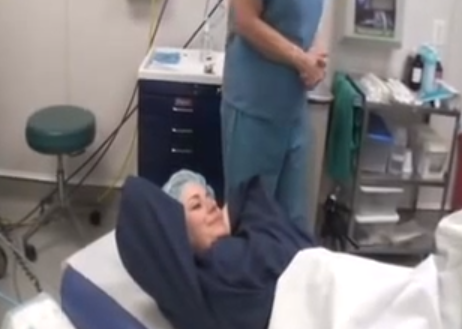Emily Letts, a 25-year-old patient advocate at the Cherry Hill Woman’s Center in New Jersey, has created a media wildfire by filming her abortion. Her three-minute video went online in mid-March, winning the Abortion Care Network’s Stigma Busting competition. On Monday, she published a follow-up essay in Cosmopolitan and attracted the attention of right-wing pundits, who declared her “irresponsible,” “insensitive,” “delusional,” “godless,” “beyond sick,” and “a witch from hell.”
In the film, a charismatic and down-to-earth Letts explains that she’s “not ready” to have children. “I’m lucky,” she says, “because I feel completely comfortable with the decision. I’m supported by everyone.” The camera follows her into a clinic, focusing on her face and upper body as a kind-voiced doctor performs the procedure. She breathes and hums softly. Guitars ripple in the background. When it’s over, Letts’ face breaks into a glowing smile. “I feel good,” she says. “I’m done. Yay.”
The next scenes take place a month and a half later, and Letts tells us, “I talk to women all the time, and they’re like, ‘Of course everyone feels bad about this. Of course everyone’s going to feel guilty,’ as if it’s a given.” She says, “I don’t feel sad. I feel in awe of the fact that I can make a life.”
The Cosmopolitan essay offers more of the same. In a soft, gauzy way (that I admit really appealed to me), Letts explains that she became an abortion counselor because “the idea of helping women through an abortion and supporting them and reassuring them that they are still wonderful and beautiful resonated deeply with me.” Her work is “this perfect world that fulfills me in so many ways.” She unveils the backstory behind the film: Letts found out about her pregnancy—her first, unplanned, she wasn’t using birth control—in November 2013. After watching a video of a women safely taking Plan B, she searched the Internet for something similar about surgical abortion and came up empty. “We talk about abortion so much and yet no one really knows what it actually looks like,” she reflects. People don’t realize how quick (three to five minutes), safe, and non-invasive it is. “I wanted to show it wasn’t scary,” she says, “and that there is such a thing as a positive abortion story.”
After conservative bloggers said and wrote a lot of horrible things about Letts, people interested in women’s rights mounted an understandable and warranted defense. Jezebel, Salon, and ThinkProgress all weighed in with thoughtful takes on why the project was necessary and important (and I am not about to argue that the project was not necessary and unimportant, so stop that). But I do understand what’s tough about comprehending Letts’ film, and the essay it inspired. On some level, they present abortion as a warm, uplifting, radiant experience, as if the procedure were totally positive and maybe everyone should go out and get one. Terminating an unwanted pregnancy can obviously produce exquisite relief and solve real problems. But does it count as a romantic expression of self-actualization? That seems like a harder sell.
“Every time I watch the video, I love it,” Letts writes. “I love how positive it is.” And she remembers “breathing and humming through it like I was giving birth. I know that sounds weird, but to me, this was as birth-like as it could be. It will always be a special memory for me.”
A special memory? Like giving birth? This is a procedure that removes cells from your body so that they do not become a baby you will produce some time in the next nine months. It is incredibly safe and often very smart. It does not have to be sad, though it can be, and it should not be shameful. But joyous? Beautiful? Fulfilling? Are we ready for a brand of feminism that is not just pro-choice but pro-abortion?
Unfortunately, the pro-life movement has forced the question. In a weird way, I think Letts’ video fits the definition for “reactionary”—it is a magnified response to a powerful social force: the attempted conservative crackdown on women’s rights. You can’t shake this film free from the context of guilt and misinformation that still surrounds abortion. Media myths, especially conservative ones, turn the procedure into something bloody and traumatic, while pop culture tells us in hundreds of TV storylines that women who obtain abortions often die or get murdered. So while it maybe feels strange to watch and read about a woman so spiritually energized by the end of her pregnancy, her counter-narrative is the direct result of a world overflowing with false arguments against abortion. The reason we don’t create rosy, feel-good films about appendectomies is that no one contests the right to remove an inflamed appendix.
Letts, it seems, knows this. “Society breeds this guilt,” she writes. “We inhale it from all directions. Even women who come to the clinic completely solid in their decision to have an abortion say they feel guilty for not feeling guilty.” Her video, though not quite an advertisement for abortion, explicitly sets out to diffuse some of the pain and confusion that clouds the issue. And because the anti-choice myths are strong, the resistance fierce, the corrective must be too.
